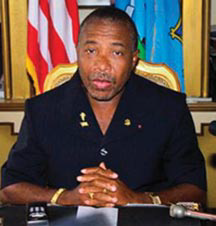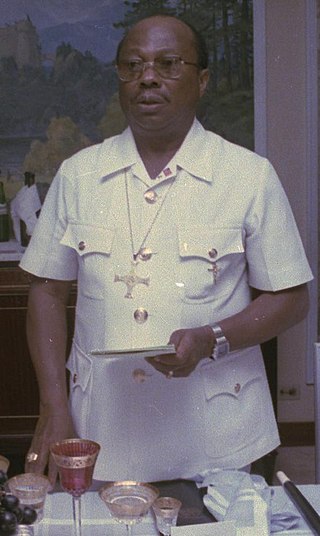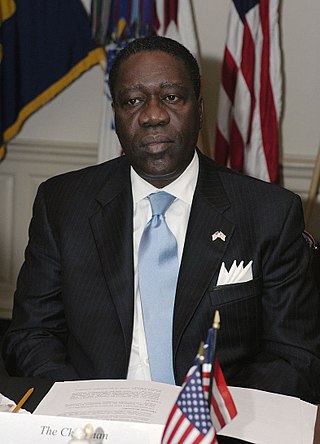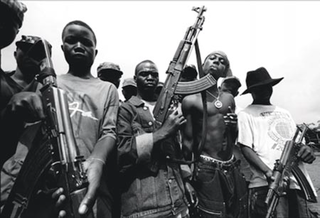Related Research Articles

Liberia is a country in West Africa founded by free people of color from the United States. The emigration of African Americans, both freeborn and recently emancipated, was funded and organized by the American Colonization Society (ACS). The mortality rate of these settlers was the highest among settlements reported with modern recordkeeping. Of the 4,571 emigrants who arrived in Liberia between 1820 and 1843, only 1,819 survived (39.8%).

Charles McArthur Ghankay Taylor is a Liberian former politician and convicted war criminal who served as the 22nd president of Liberia from 2 August 1997 until his resignation on 11 August 2003 as a result of the Second Liberian Civil War and growing international pressure.

Samuel Kanyon Doe was a Liberian politician who served as the 21st president of Liberia from 1986 to 1990. He ruled Liberia as Chairman of the People's Redemption Council (PRC) from 1980 to 1986 and then as president from 1986 to 1990.
Prince Yormie Johnson is a Liberian politician who has served as a senator for Nimba County since 2006. A former rebel leader, Johnson played a prominent role in the First Liberian Civil War.

The president of the Republic of Liberia is the head of state and government of Liberia. The president serves as the leader of the executive branch and as commander-in-chief of the Armed Forces of Liberia.

William Richard Tolbert Jr. was a Liberian politician who served as the 20th president of Liberia from 1971 until his assassination in 1980.

Charles Gyude Bryant was a Liberian politician and businessman. He served as the Chairman of the Transitional Government of Liberia from 14 October 2003 to 16 January 2006. The installation of the transitional government was part of the peace agreement to end the country's second civil war, which had raged since the Liberians United for Reconciliation and Democracy (LURD) rebelled against President Charles Taylor in 1999. Bryant was previously a businessman and was chosen as chairman because he was seen as politically neutral and therefore acceptable to each of the warring factions, which included LURD, the Movement for Democracy in Liberia (MODEL), and loyalists of former President Taylor. He was a prominent member of the Episcopal Church of Liberia, and was critical of the governments of Samuel Doe (1980–90) and Taylor (1997–2003).

The First Liberian Civil War was the first in a series of two civil wars within the West African nation of Liberia. It lasted from 1989 to 1997. President Samuel Doe established a regime in 1980 but totalitarianism and corruption led to unpopularity and the withdrawal of support from the United States by the late 1980s. The National Patriotic Front of Liberia (NPFL) led by Charles Taylor invaded Liberia from the Ivory Coast to overthrow Doe in December 1989 and gained control over most of the country within a year. Doe was captured and executed by the Independent National Patriotic Front of Liberia (INPFL), a splinter faction of the NPFL led by Prince Johnson, in September 1990. The NPFL and INPFL fought each other for control of the capital city, Monrovia and against the Armed Forces of Liberia and pro-Doe United Liberation Movement of Liberia for Democracy. Peace negotiations and foreign involvement led to a ceasefire in 1995 but fighting continued until a peace agreement between the main factions occurred in August 1996. Taylor was elected President of Liberia following the 1997 Liberian general election and entered office in August of the same year.

The Liberian People's Party (LPP) is a political party in Liberia.
Movement for Justice in Africa (MOJA) is a pan-African political organization in Liberia, with chapters in Ghana and The Gambia. It was founded in 1973 by Togba Nah Tipoteh, who is currently its president.
Ruth Sando Fahnbulleh Perry was a Liberian politician. She served as the interim Chairman of the Council of State of Liberia from 3 September 1996 until 2 August 1997, following the First Liberian Civil War. After eleven international peace attempts between 1990 and 1995 to end the civil war in Liberia, the attempts appeared to succeed. The interim Council of State consisted of a civilian chairman, as well as members of warring factions: Charles Taylor, United Liberation Movement of Liberia for Democracy-K leader Alhaji Kromah, Liberia Peace Council leader George Boley, and two other civilians.

The Second Liberian Civil War was a civil war in the West African nation of Liberia that lasted from 1999 to 2003.
The National Patriotic Front of Liberia (NPFL) was a Liberian rebel group that initiated and participated in the First Liberian Civil War from 24 December 1989 – 2 August 1997. The NPFL emerged out of rising ethnic tensions and civil unrest due to the Liberian government that was characterized by totalitarianism, corruption, and favoritism towards ethnic Krahns. The NPFL invaded Liberia through Ivory Coast’s border with Nimba County in Liberia under the direction of Charles Taylor, a former Liberian politician and guerrilla leader who served as the 22nd president of Liberia from 2 August 1997 until his resignation on 11 August 2003.
Theophilus Ernest Eastman was a Liberian diplomat, statesman and politician. A leading member of the young and dynamic foreign policy team at the Department of State in the 1960s during the Tubman administration, he was a major architect of President Tubman's extensive involvement in Pan-African politics, serving first as Director of the Africa-Asia Bureau and then as Under-Secretary of State. In 1972, President Tolbert appointed him Ambassador to Kenya, Uganda, and Tanzania, resident in Nairobi, Kenya. He later served, from 1978 to 1983, as the second Secretary-General of the Mano River Union. From 1983 to 1986, he was the Minister of Foreign Affairs under dictator Samuel Doe, succeeding Henry Boimah Fahnbulleh and preceding John Bernard Blamo. President Charles Ghankay Taylor later appointed him to be the Minister of State for Presidential Affairs before returning him to the Foreign Ministry. He represented the National Patriotic Party at ECOWAS-sponsored peace talks in Banjul.
A new civil war began in 1999 when a rebel group backed by the government of neighboring Guinea, the Liberians United for Reconciliation and Democracy (LURD), emerged in northern Liberia. By the spring of 2001, they were posing a major threat to the Taylor government. Liberia was now engaged in a complex three-way conflict with Sierra Leone and the Guinea Republic. By the beginning of 2002, both of these countries were supporting the latest addition to the lexicon of Liberian guerrilla outfits – Liberians United for Reconciliation and Democracy (LURD), while Taylor was supporting various opposition factions in both countries. By supporting Sierra Leonean rebels, Taylor also drew the enmity of the British and Americans.
Jackson Fiah Doe was a Liberian politician in the late twentieth century.

The 1980 Liberian coup d'état happened on April 12, 1980, when President William Tolbert was overthrown and murdered in a violent coup. The coup was staged by an indigenous Liberian faction of the Armed Forces of Liberia (AFL) under the command of Master Sergeant Samuel Doe. Following a period of transition, Doe ruled Liberia throughout the 1980s until his murder in 1990 during the First Liberian Civil War.
Miatta Fahnbulleh is a Liberian singer and social activist. As of May 2017, she was the interim coordinator of Concerned Citizens to Protect the Constitution.
Christopher Minikon was a Liberian public servant, statesman, ambassador, professor, historian, and businessman. Minikon served various lower-level and Cabinet-Level positions in the Liberian government in the administrations of William Tubman, William R. Tolbert, Samuel K. Doe, Amos Sawyer, David D. Kpormakpor, Wilton G. S. Sankawulo, Ruth Perry, Charles Taylor, Moses Blah, Gyude Bryant, and Ellen Johnson Sirleaf. While working various positions, he also taught classes at The University of Liberia on various subjects such as, history, diplomacy, law, and others.
Events in the year 2016 in Liberia.
References
- 1 2 Elwood D. Dunn, Amos J. Beyan, Carl Patrick Burrowes, Historical Dictionary of Liberia, The Scarecrow Press, 2001 (2nd edn), pp. 129–30.
- ↑ White House, Guest List for the Luncheon in Honor on the Visit of President Ellen Johnson Sirleaf, March 21, 2006.
- ↑ C. Emmanuel Johnson, "Liberia: Fahnbulleh, Carlor, Gen. Dubar Refuse to Apologize", AllAfrica, August 18, 2008.
- ↑ "Treason Trial On". Liberian Star, June 11, 1968: 1/8.
- ↑ "Fahnbulleh Asks for a New Trial". Liberian Star, July 9, 1968: 1/8.
- ↑ "Miatta Fahnbulleh Ready To Make Liberia Proud at Nobel Peace Prize Concert", FrontPage Africa, November 21, 2011. Accessed June 29, 2012.
- ↑ "Our Personality Of The Week Is Mother Mary Brownell; The Mother For All" Archived 2019-07-14 at the Wayback Machine , GNN Liberia, October 23, 2016.
- ↑ Lindsay Barrett, "MA MARY PASSES ON | Liberian Peace and Civil Rights Heroine Dies At 88", The N Report.
- ↑ Voices of Protest: Liberia on the Edge 1974-1980, author's biography
- ↑ Women and Post-conflict Development: A Case Study on Liberia Archived June 4, 2011, at the Wayback Machine , p. 54.
- 1 2 Charles Taylor interview with Baffour Ankomah, Ghanaian Chronicle (Accra), 12–18 October 1992, Kwesi Yankah and Lazarus D. Maayang, "Charles Taylor: dark days in Ghana", Uhuru (Accra), 3 (1990), pp. 39–42, Mark Huband, "The Liberian Civil War", pp. 47–51, all cited in Stephen Ellis, The Mask of Anarchy, London: Hurst and Company, 1999, p. 68.
- ↑ "Fahnbulleh Speaks". Monrovia Weekend, March 23/24, 1991: 1/7.
- ↑ Barrett, Lindsay (April 15, 2017). "Adieu, Ma Mary Brownell". Daily Trust. Archived from the original on February 3, 2018. Retrieved February 2, 2018.
